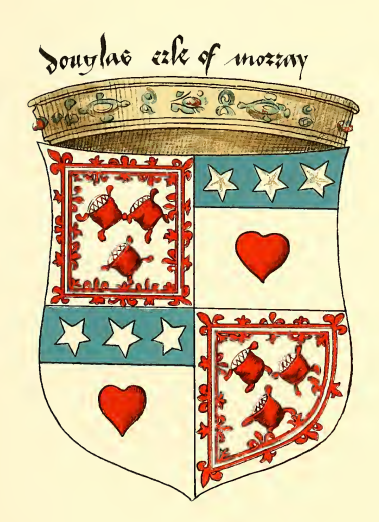Archibald Douglas, Earl of Moray
Archibald Douglas, Earl of Moray (1426 – 18 May 1455) was a Scottish
nobleman during the reign of King James II of Scotland. He was one
of the five brothers from the Black Douglas family who clashed with
the king.
He was a twin brother of
James Douglas, 9th Earl of
Douglas. In later years, James was believed to be the older by only
a few minutes, as he inherited the earldom of Douglas, when their
older brother was killed by the king, but it has been suggested that
in earlier years Archibald was believed to be the older.
He
became Earl of Moray jure uxoris (in right of his wife) by marrying
Elizabeth Dunbar, 8th Countess of Moray.
He was responsible for the razing of
Duffus Castle in 1452.
He was killed
fighting the king's supporters at the
Battle of Arkinholm.
FORFEITUKE OF THE EARLDOM OF MORAY
John Dunbar married
King Eobert 11. 's daughter, who, March 2nd 1372, gave the Earldom
of Moray (except Badenoch, Lochaber, and the castle of Urquhart)
dilecto filio nostro Joanni de Dunbar and Mariotas Sponsse ejus
filiae nostras charissimae " f (Publ. Archiv.). Their sons were.
Earl Thomas and Alexander of Frenderet. Earl Thomas, leaving no male
issue, was succeeded by his nephew Earl James son of Frenderet, who
married, 1st, Isabel, daughter of Sir "Walter Innes of Innes, who
brought him a son Alexander; and, 2ndly, Janet Gordon, daughter of
Huntley, by whom he had Janet, married to James second Lord
Crichton, Lord Chamberlain of Scotland ;and Elizabeth, married to
Archibald brother to the Earl of Douglas. Earl James died about anno
1446, and his son ought to have succeeded him ; but because his
mother Isabel Innes (who stood in the 4th degree to her husband)
died before a dispensation was obtained, the power of the Douglasses
got Alexander declared illegitimate, made his eldest sister renounce
her right, and Archibald Douglas, husband of the younger sister, was
made Earl of Moray anno 1446. Thus was Alexander, son of Earl James,
unjustly deprived.
But, to make some compensation to him he was
knighted, made heritable sheriff of Moray, and got an opulent
estate. And Archibald Douglas, having joined in his brother's
rebellion, was slain in the field of battle, and the Earldom of
Moray was forfeited, and annexed to the Crovm anno 1455, where it
remained, till King James lY. bestowed it on his bastard son James,
by Jean daughter of John Lord Kennedy in the year 1501 ; Who, dying
in the year 1544, without male issue, it again reverted to the
Crown, where it remained till the 10th of February, 1562, when Queen
Mary conferred it on her base brother James, afterwards Eegent;
whose eldest daughter, Lady Elizabeth, conveyed it to her husband
James Lord Down, whose issue at present enjoy it, as will be more
fully shown afterwards.
The barony of Pettie was anciently a part of the Earldom of Moray,
but upon the death of Earl Archibald Douglas, anno 1455, the Castles
of Inverness and Urquhart, and the lordships of them, the water
mails of Inverness, the Lordship of Abernethie, the baronies of
Urquhart, Glenurchan, Boneich, Bonochar, Pettie, Brachlie, and
Strathern, with the pertinents, were annexed to the Crown {Act Pari.
1455).
Above Inverness, 3 miles on the river, is Borlum. This was a part of
the estate of the Earl of Moray ; and after the forfeiture of Earl
Archibald Douglas, the Laird of Findlater obtained this barony and
held it of the Crown, and his son was designed Ogilvie of Cardale.
And upon the forfeiture of Earl Archibald Douglas, anno 1455,
Urquhart was annexed to the Crown.
 |
| Arms
of Douglas, Earl of Moray. Quarterly, 1st and 4th, The arms of
Randolph, Earl of Moray, above blazoned, 2nd and 3rd, a man's heart
ensigned with an Imperial Crown proper, on a chief azure, three
stars of the field. |
The Buke of the
Howlat, often referred to simply as The Howlat, is a humorous
15th century Scots poem by Richard Holland. The Howlat was composed
in the late 1440s for Elizabeth Douglas, wife of Archibald Douglas,
earl of Moray. It is one of the great monuments of fifteenth-century
Scots verse, perhaps the finest example of Older Scots alliterative
poetry
Any contributions will be
gratefully accepted
Errors and Omissions
|
|
The Forum
|
|
What's new?
|
|
We are looking for your help to improve the accuracy of The Douglas
Archives.
If you spot errors, or omissions, then
please do let us know
Contributions
Many articles are stubs which would benefit from re-writing.
Can you help?
Copyright
You are not authorized to add this page or any images from this page
to Ancestry.com (or its subsidiaries) or other fee-paying sites
without our express permission and then, if given, only by including
our copyright and a URL link to the web site.
|
|
If you have met a brick wall
with your research, then posting a notice in the Douglas Archives
Forum may be the answer. Or, it may help you find the answer!
You may also be able to help others answer their queries.
Visit the
Douglas Archives Forum.
2 Minute Survey
To provide feedback on the website, please take a couple of
minutes to complete our
survey.
|
|
We try to keep everyone up to date with new entries, via our
What's New section on the
home page.
We also use
the Community
Network to keep researchers abreast of developments in the
Douglas Archives.
Help with costs
Maintaining the three sections of the site has its costs. Any
contribution the defray them is very welcome
Donate
Newsletter
If you would like to receive a very occasional newsletter -
Sign up!
Temporarily withdrawn.
|
|
|
|
|
|
|
|


